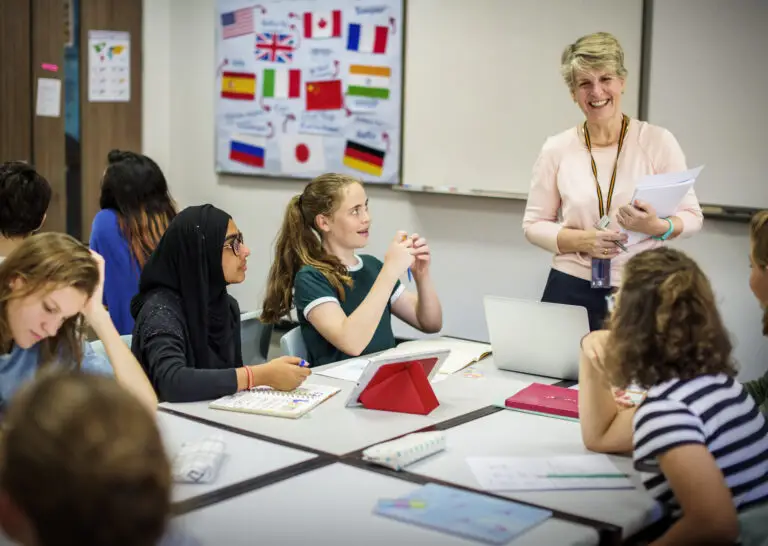It’s no secret that language learning in England has been facing downward trends in recent years. In 2019, Ofqual reported that entries to modern foreign language (MFL) exams had dropped by almost half since 2002.
Brexit provides an interesting context to MFL learning. The place of English as the presumed lingua franca in Europe is now in question, and the ability to communicate with political and business leaders – both in Europe and further afield – is imperative. In a recently published report on ‘The Future UK-EU relationship’, the House of Lords’ European Affairs Committee reflected on the impact of the UK’s withdrawal from the Erasmus+ programme on the higher education sector, both in Britain and abroad. In its recommendations, the Committee bemoaned the fact that the UK’s Turing scheme, designed to replace the Erasmus+ programme, does not currently allow for reciprocal exchanges between British and European institutions. This has resulted in ‘watered-down’ cultural exchanges, and reduced opportunities for British students and institutions to welcome and interact with their counterparts from abroad. Taith, a similar scheme implemented by the Welsh Government, does have scope for reciprocal exchanges, raising questions about why the Turing scheme is not similarly set up.
Proponents of the Turing scheme have pointed to its ‘global’ outlook, with funding available for work and study abroad opportunities no longer limited to Europe – certainly a positive development. However, the Turing scheme website places a clear emphasis on boosting employability whilst building business and trade connections, with scant mention of language skills. When examining the data for Turing scheme Higher Education placements in 2022/2023, the most popular destination is the USA. Of the six most popular destinations, (the USA, Spain, France, Germany, Canada and Australia), three are Anglophone nations, presenting little to no benefit in terms of language learning/exchange. The remaining three nations would have been covered by Erasmus+ funding prior to the UK’s withdrawal from the programme in 2020.
There is certainly a public appetite for bolstering language learning, particularly in school settings. In a survey of 3,000 people across the UK, the British Council found that one in four adults regret never learning a second language, with the highest level of expressed desire to learn languages coming from 18–24-year-olds.
Studying languages is only a National Curriculum requirement for Key Stages Two and Three, and at GCSE level, the current rate of uptake of modern foreign languages is a mixed bag. Whilst Spanish was amongst the most popular subjects for the 2022 exam season (with a growth of 11.5% in the number of students sitting the exam since 2019), German saw a decrease of more than 10%.
The government has made some gestures towards MFL learning in schools. In March, the Department for Education announced that a contract worth almost £15 million had been awarded to UCL’s Institute of Education to fund a programme of language education in primary and secondary schools over the next three years. The programme will focus on groups currently least likely to take up MFL qualifications – boys, disadvantaged pupils and those with SEND. Some of this funding will also be allocated to expand the Home Languages Accreditation, which aims to encourage bilingual pupils to obtain GCSEs and A-levels in their home/heritage language.
This bump in funding coincides with curriculum reforms on languages; a review of the Chinese A-level and an additional £1.1 million for the Mandarin Excellence Programme, as well as pedagogical changes to the GCSE curriculum for French, German and Spanish to focus on essential language ‘building blocks’. The government has also increased funding options for those wishing to train as languages teachers (particularly French, German and Spanish).
However, critics have argued that more far-reaching commitments are needed. Recruitment and retention of teachers is a key issue, with analysis from the Liberal Democrats suggesting that the government has missed its recruitment targets every year over the past five years for modern languages (as well as for maths and physics). The Turing scheme only has confirmed funding until 2025, and some have suggested that its funding for schools is much lower than it would have been under Erasmus+. And while top universities have been able to increase the breadth of language degree courses available (with some indications that Chinese is overtaking Italian in popularity at a degree level), the number of modern languages graduates dropped by 54% in the years between 2008-9 and 2017-18 and language department closures mirror this decrease in students.
It would appear that in its aim to build ‘a global Britain’, with limited language capabilities the government may soon find it difficult to even talk the talk. In her address to the National Association of Head Teachers last month, Labour’s Shadow Education Secretary Bridget Phillipson pledged to recruit and train more than 6,500 new teachers. Though she did not mention any specific subject gaps, recent analysis from the Party suggests MFL subjects are on the dashboard, as almost one in five French and German lessons in the past year had been taught by a non-expert teacher. In the lead-up to the next general election, it will certainly be interesting to see what level of priority both Labour and the Conservatives accord to MFL learning as they both vie to be the party to boost the UK’s skillsets and build a globally-facing economy.





